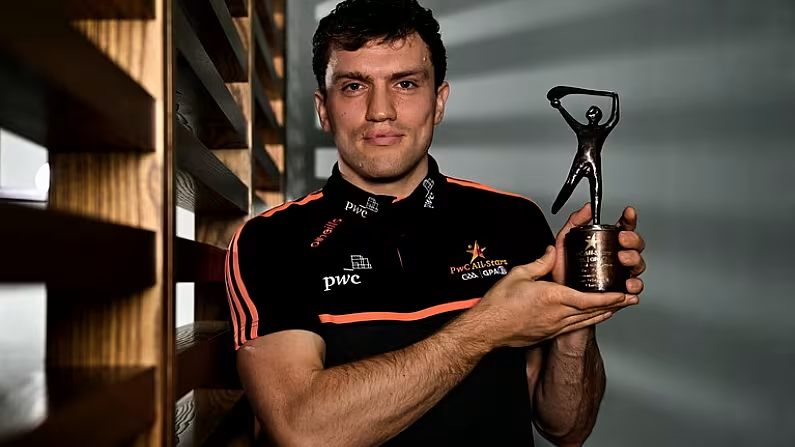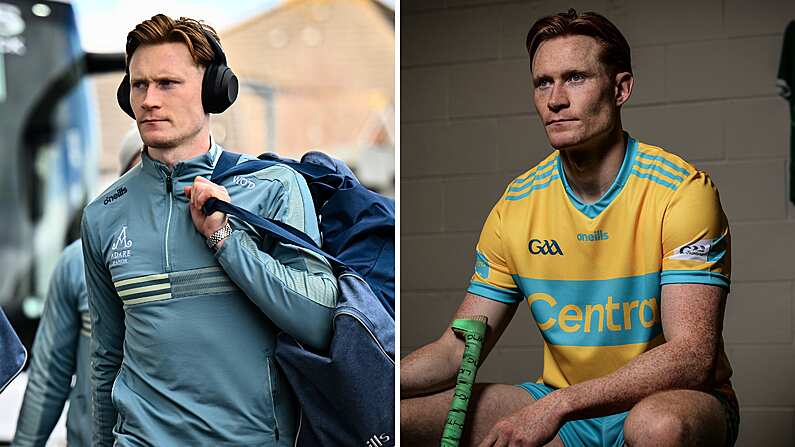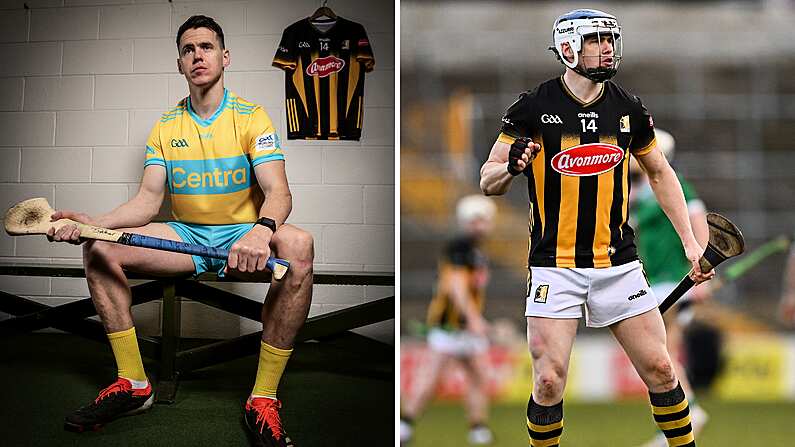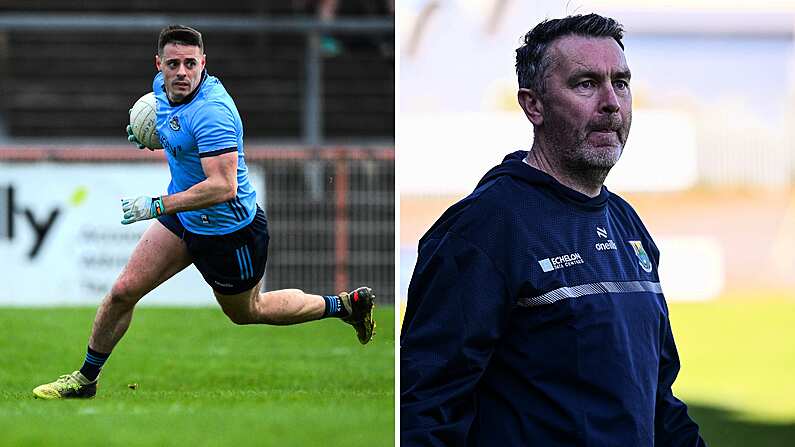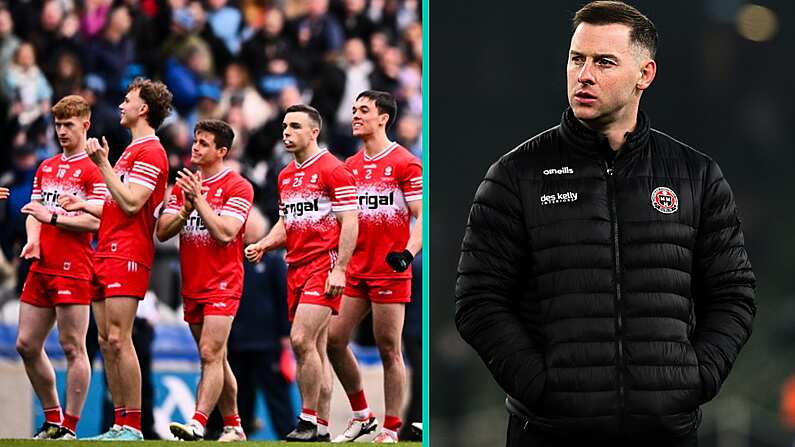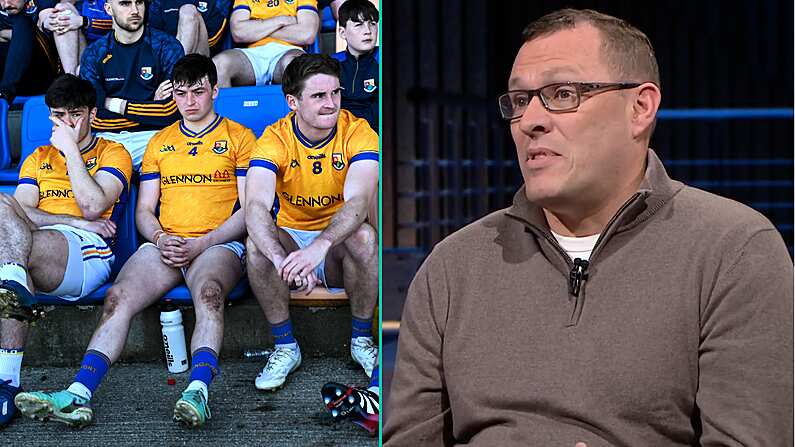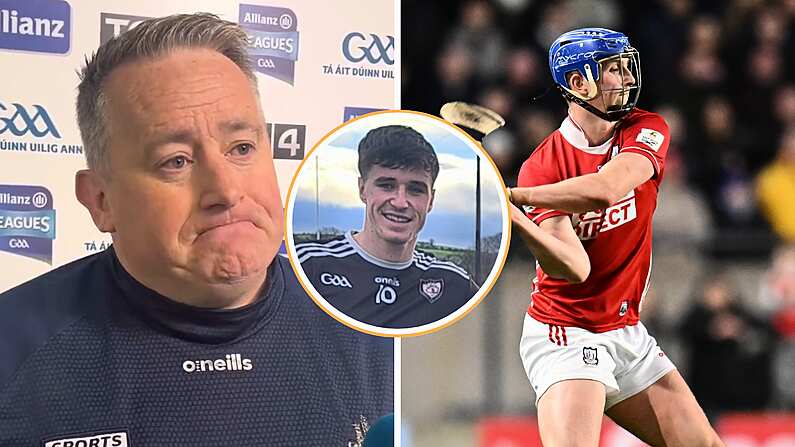Last week, a photo popped up on Shane O'Donnell's phone. "I was like 'Oh God, that's a memory I could do without,'" he says. It was one which reminded the Clare man of a time when he thought he'd never play hurling again.
During a training session for a National League game in 2021, O'Donnell suffered a concussion which not only ruled him out of the championship, but also caused six to seven weeks when his "brain was not functioning".
"I could not process anything," says O'Donnell, the PwC GAA/GPA Player of the Month for May in hurling.
"Going from having a normal function where you go through your day and expect things to work, to having an extended period of time, the guts of two months, where suddenly you can't process thoughts, your brain isn't working well, you're having all these extreme symptoms, pressure in your head. It was an extremely difficult time.
"And also psychologically, it's hard to know when that's going to end. And if it's going to end, because the nature of concussion, it isn't just that you start with really bad symptoms, and it gradually gets better. It comes at you round after round. And it feels like you're never going to get to the end of it, being honest."
'I only wanted one thing, and hurling wasn't that thing'
12 months ago, O'Donnell was "definitely 100 per cent certain I was never coming back".
"Hurling was gone," he says.
"Once I had fully come to terms with what happened a few days after, and I was feeling the full brunt of the symptoms, I'd accepted that I wasn't ever going to hurl again. I'd fully accepted that, it wasn't an issue.
"I just thought that I'm never putting myself through this again. And if I've to give up hurling then that's a small price to pay.
"For four or five weeks after it happened, I can't emphasise how low on my scales of priority hurling was. Just being able to operate normally, and for my brain to function, that was the priority, and nothing else was on my radar.
"I heard a good quote, somebody said to me a few months ago that 'A healthy person has a thousand wishes and a sick person only has one', and that's honestly how I felt. I only wanted one thing, and hurling wasn't that thing. I didn't really care about it, to be honest."
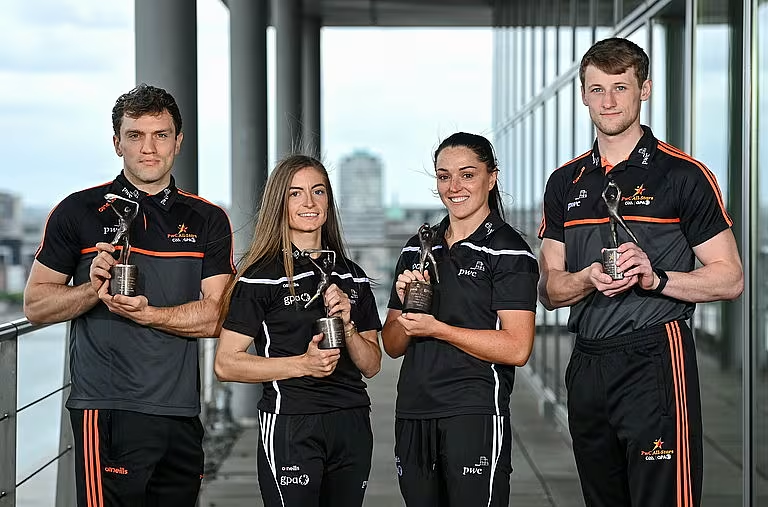
13 June 2022; PwC GAA/GPA Player of the Month for May, Clare hurler Shane O'Donnell, PwC GPA Players of the Month Waterford Camogie player Lorraine Bray and Dublin footballer Sinéad Goldrick, and PwC GAA/GPA Player of the Month Derry footballer Brendan Rogers with their awards at PwC HQ in Dublin. Photo by Sam Barnes/Sportsfile
The 27-year-old's professional CV is just as impressive as his hurling one. He did a degree in genetics at UCC, and then a PhD in microbiology. The scientist in him wanted to research concussion while he was suffering from the symptoms, but that wasn't possible because he was unable to read. Once the symptoms had eased, he was able to do some reading on the condition. He understood it more, and felt some anxiety lift.
O'Donnell played in a few Clare Championship games with Éire Óg and then took an extended break in the off-season, wanting to buy himself time to make sure he'd recovered fully, and for a specialist to give him the nod.
"He told me 'Physically, you're fine. But I think you still have psychological [hang-ups], you're concerned about it basically... the best way to handle the anxiety like this is exposure,'" he explains.
I came back in March this year. Brian [Lohan], and all them managing the team, were so accommodating. If I had a management team who said, 'You have to be at training on January 1', I'd be like, 'OK, I'm not playing. I don't want to commit to that. I don't want to be there'. Being able to get that extra bit of time made all the difference.
The 2013 All-Ireland winner's experience leads him to believe that inter-county teams should be required to conduct a baseline assessment of each player, one which would make it easier to diagnose a concussion.
"There's a concussion network that are reaching out to inter-county teams to get a baseline level of people's normal, everyday function, their abilities," he says.
"So if you do take a hit, you are able to compare it to your baseline so you can say, 'This person has clearly experienced a concussion here'.
"It's hard to nail down. Some of the symptoms that you feel might be how you feel on a bad day or when you didn't sleep well.
"On the pitch, it's so hard. Even with the last 12 months I've gone through, and I know what the symptoms are like... If I took a hit last weekend in a big game with a huge crowd, it would be so hard for me to objectively assess whether I was OK or not. That's just the nature of the injury.
"You can be extremely cautious, and that's the way to go about. I would advocate for where someone takes a hit where they might be concussed, they just have to be pulled out, and that should be a mandatory requirement.
"Outside of that. It's hard to tell what's a concussive hit, and what's not. The impact I took 12 months ago, it was bad but it certainly would not have led you to believe that I'd experience what I experienced after it."

5 June 2022; Kyle Hayes of Limerick is tackled by Shane O'Donnell of Clare during the Munster GAA Hurling Senior Championship Final match between Limerick and Clare at FBD Semple Stadium in Thurles, Tipperary. Photo by Piaras Ó Mídheach/Sportsfile
His time away from the pitch has had one striking benefit: The Shane O'Donnell who returned for this year season is noticeably more muscular.
"I definitely feel like I've put on a bit of weight and feel like it's helping too," he says.
"The games are extremely physical in Munster and having that extra couple of kilos has done no harm - you're able to get involved in things that maybe you wouldn't have had the impact without it."
That extra muscle undoubtedly helps in his new role. For the game against Tipperary in April - his first championship game in two years - O'Donnell lined out in the half-forward line, a little deeper than his usual full-forward line station.
"It definitely gives you more freedom to actually impact the game when you're not getting delivered ball directly," he says.
"In the corner you kind of need to be fed the ball a lot of the time and wing-forward is completely different. You can just keep working, even get in the way of the opposition by tracking back.
"You're doing whatever needs to be done but you can actually influence the game without needing to be directly involved in it by another team-mate. I really enjoy that.
"There's also the element of not being as tightly marked. Depending on the team you're playing, sometimes you can have more or less freedom. It gets you onto the ball, makes you feel like you're actually involved in a game more, definitely. There's pros and cons.
"I always loved playing in the corner. When things are going well in the corner there's no better position and I still believe that. But wing-forward at the moment I'm really enjoying.
"For a number of years with Clare it could be a two or one-man full-forward line. At the time I never felt frustrated by it, I always felt like I was contributing to the team effort. That if there were two men on me there was a spare man somewhere else that we were doing the right thing.
"It was never a frustration thing really but it didn't yield the results that we'd have liked from it, definitely. Looking back on those games (it was) possibly not the right way to play in hindsight, but it's easy to say that with 20/20 vision looking backwards."
The Munster final defeat to Limerick aside - one which was difficult to hurdle psychologically - O'Donnell is enjoying the "absolute tonic" of being back on the pitch with Clare.
"I came back with the attitude that you don't know when it's going to end," he says.
"I'm just going to take it a year at a time. And if I don't play next year... that might happen. That gives you a level of freedom but also it puts it all in perspective. What is the worst thing that can happen?
"If we lose a game yeah that's devastating and last week was the most disappointed I've been in a long time when it comes to a game but at the same time I'd rather lose 10 Munster finals like that in a row rather than take the impact and have the summer and year I've had over the last 12 months. So it really does put that in perspective."


